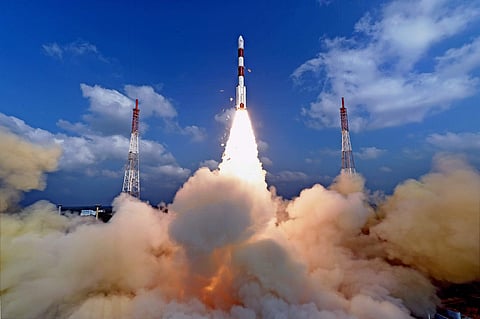

BENGALURU: While satellite-enhanced capabilities for cyberspace are fuelling excitement globally, there are increasing concerns over the safety of space infrastructure to ensure cyber security, according to Tobias Feakin, Ambassador for Cyber Affairs & Critical Technology at the Australian Department of Foreign Affairs and Trade.
Feakin, who is the head of the Australian government’s international engagement to advance and protect its national security, foreign policy, economics, trade, and development interests in the internet and in cyberspace, noted that cyber security through space infrastructure plays a crucial role with the enormous amount of bandwidth capabilities that satellites are now providing.
Speaking at a session on ‘From Cyberspace to Outer Space: Innovating with Australia in a post-COVID world’ at the Bengaluru Tech Summit 2020 on Friday, he said there is a huge amount of bandwidth uplift now with satellites catering to remote places rapidly, with such capabilities also being utilised in Australia’s development programmes in India.
“Yet, just like a lot of legacy equipment, such as energy plant or piece of transportation or other critical infrastructure from decades ago, spacecraft too weren’t designed with cyber secuity in mind,” he said, pointing out that its need has been heightened now.
Exciting time for India, Australia ties: Expert
“When security gets compromised, there is a whole array of threats. One begins to get bandwidth interruption, unwanted data transfers to malicious third parties; even reliability of satellites can be disrupted,” Tobias Feakin said. Lloyd Damp, Chief Executive at Southern Launch, who sees a silver lining for the space sector in the midst of the pandemic, believes it is an exciting time for both India and Australia to work towards some big challenges of cyber security, telecommunication, and look at how quantum computing can be applied in these areas.
Australia can play a unique part in realising a lot of these futuristic goals, he said. Damp attributed Australia’s ability to track space debris, manage space traffic activities, have a world-leading Earth observation service, and efficient rocket technology, besides remote asset management, to the country’s geographical position, wide open spaces and relatively low light pollution, as well as to Australia’s expertise in satellite data applications.
Speaking about the recent announcements on opening up the space sector to private players, Michael Costa, Deputy Consul General for South India at the Australian Consulate General, Chennai, said he was looking forward to further opportunities for collaborations on end-to-end space missions. “Australia and India have been collaborating since 1987 to support data calibration and laser ranging for Indian satellites, launching Australian satellites, and conducting joint research. While Australia signed an MoU with India in 2012 to expand cooperation in space sciences, technology and education, there was potential to do more together,” he added.
K’taka signs 8 MoUs
Bengaluru: The Karnataka Government on Friday announced eight MoUs and intentions for collaboration with partner countries. Countries like Finland, the Netherlands, Sweden, the UK and the USA showed their intent in partnering with Karnataka in the areas of skilling, R&D, ecosystem connects, life science and biotechnology, healthcare, etc.